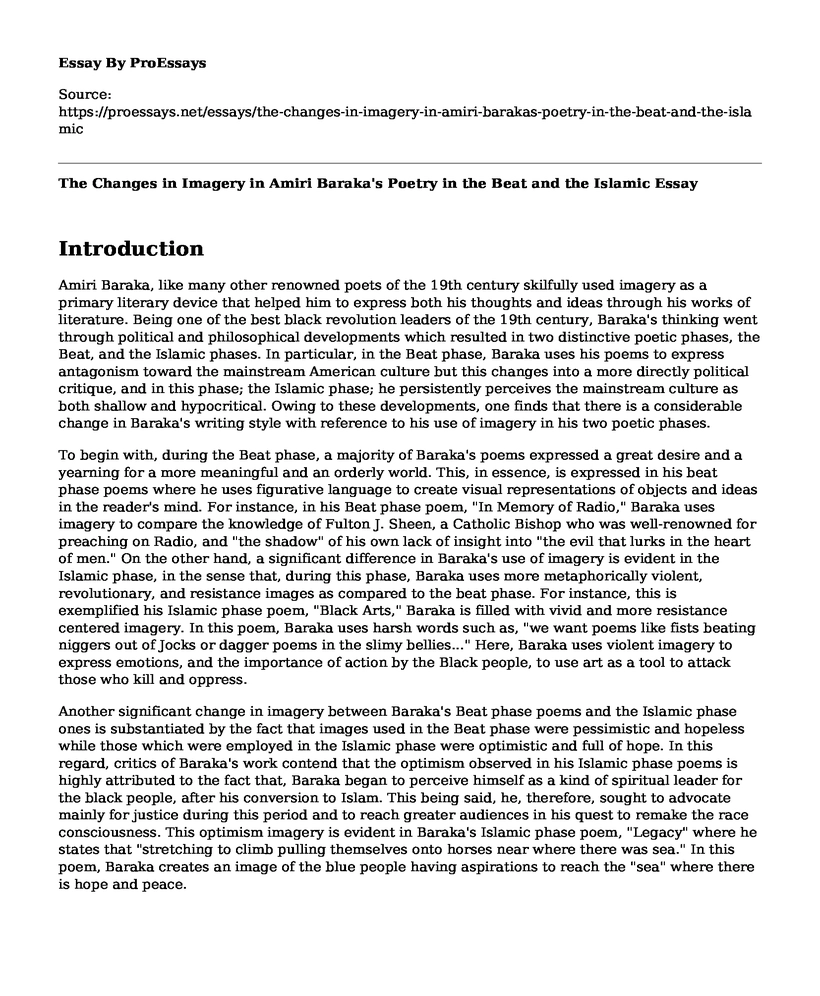Introduction
Amiri Baraka, like many other renowned poets of the 19th century skilfully used imagery as a primary literary device that helped him to express both his thoughts and ideas through his works of literature. Being one of the best black revolution leaders of the 19th century, Baraka's thinking went through political and philosophical developments which resulted in two distinctive poetic phases, the Beat, and the Islamic phases. In particular, in the Beat phase, Baraka uses his poems to express antagonism toward the mainstream American culture but this changes into a more directly political critique, and in this phase; the Islamic phase; he persistently perceives the mainstream culture as both shallow and hypocritical. Owing to these developments, one finds that there is a considerable change in Baraka's writing style with reference to his use of imagery in his two poetic phases.
To begin with, during the Beat phase, a majority of Baraka's poems expressed a great desire and a yearning for a more meaningful and an orderly world. This, in essence, is expressed in his beat phase poems where he uses figurative language to create visual representations of objects and ideas in the reader's mind. For instance, in his Beat phase poem, "In Memory of Radio," Baraka uses imagery to compare the knowledge of Fulton J. Sheen, a Catholic Bishop who was well-renowned for preaching on Radio, and "the shadow" of his own lack of insight into "the evil that lurks in the heart of men." On the other hand, a significant difference in Baraka's use of imagery is evident in the Islamic phase, in the sense that, during this phase, Baraka uses more metaphorically violent, revolutionary, and resistance images as compared to the beat phase. For instance, this is exemplified his Islamic phase poem, "Black Arts," Baraka is filled with vivid and more resistance centered imagery. In this poem, Baraka uses harsh words such as, "we want poems like fists beating niggers out of Jocks or dagger poems in the slimy bellies..." Here, Baraka uses violent imagery to express emotions, and the importance of action by the Black people, to use art as a tool to attack those who kill and oppress.
Another significant change in imagery between Baraka's Beat phase poems and the Islamic phase ones is substantiated by the fact that images used in the Beat phase were pessimistic and hopeless while those which were employed in the Islamic phase were optimistic and full of hope. In this regard, critics of Baraka's work contend that the optimism observed in his Islamic phase poems is highly attributed to the fact that, Baraka began to perceive himself as a kind of spiritual leader for the black people, after his conversion to Islam. This being said, he, therefore, sought to advocate mainly for justice during this period and to reach greater audiences in his quest to remake the race consciousness. This optimism imagery is evident in Baraka's Islamic phase poem, "Legacy" where he states that "stretching to climb pulling themselves onto horses near where there was sea." In this poem, Baraka creates an image of the blue people having aspirations to reach the "sea" where there is hope and peace.
Conclusion
During the Islamic phase, Baraka was primarily interested in the Black Power Movement, pan-Africanism, Black Muslim philosophy, and politics among many others. Nonetheless, at some point in this phase, 1974, Baraka became to perceive the cultural nationalist positions as overly narrow in their concerns. In this regard, Baraka contended that class, in this case, determined the social, political, as well as the economic realities of the people's lives. This, in essence, made him shift his writing focus and politics to a more Marxist-Leninist-centered thought.
Cite this page
The Changes in Imagery in Amiri Baraka's Poetry in the Beat and the Islamic. (2022, Apr 01). Retrieved from https://proessays.net/essays/the-changes-in-imagery-in-amiri-barakas-poetry-in-the-beat-and-the-islamic
If you are the original author of this essay and no longer wish to have it published on the ProEssays website, please click below to request its removal:
- Critical Essay on Changes in the "Little Sister Born in This Land"
- The Veldt by Ray Bradbury - Literary Analysis Essay
- Essay Example on Interpretation of a Fiction Story: A Rose for Emily
- Essay Sample on Portrayal of Human Behavior in Hamlet: To Be or Not To Be
- Irony in Jane Austen's Pride and Prejudice Essay
- Rap Music: Is It Poetry? Essay Example
- Essay Example on Huck's Ordinary Life: Fear, Fight & Flight







